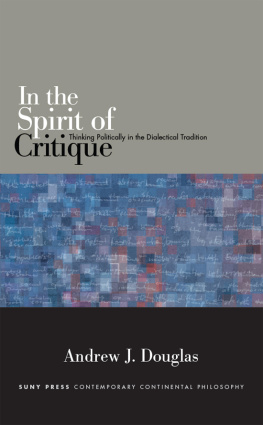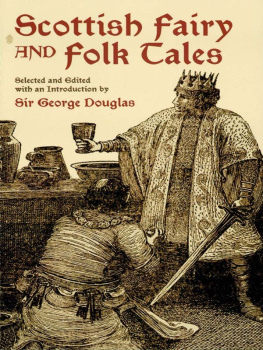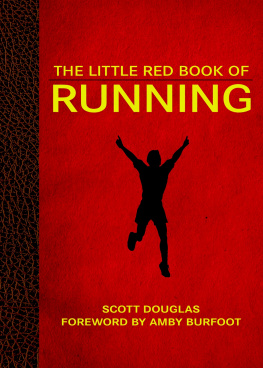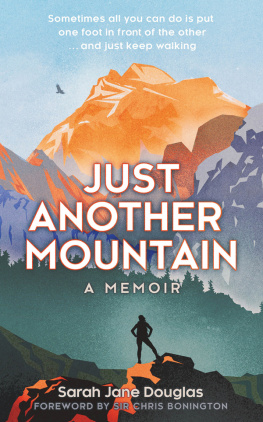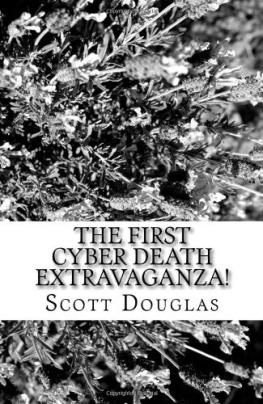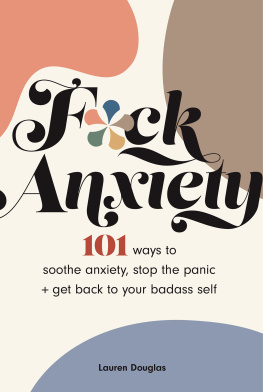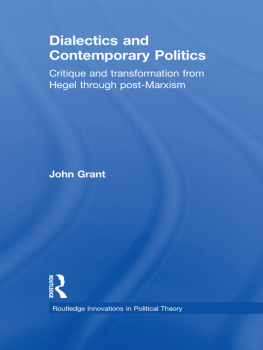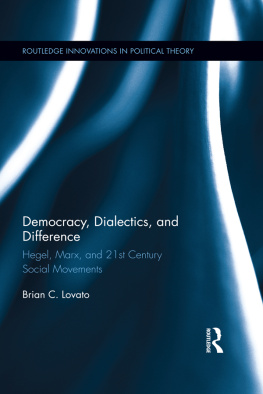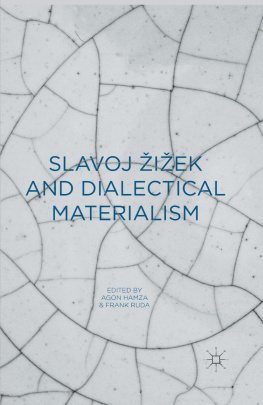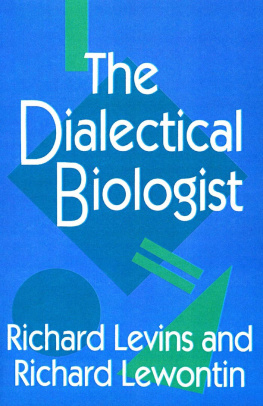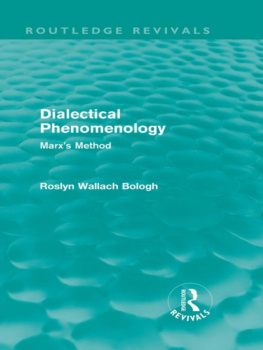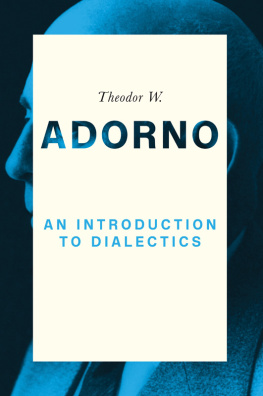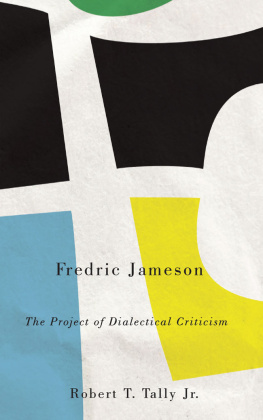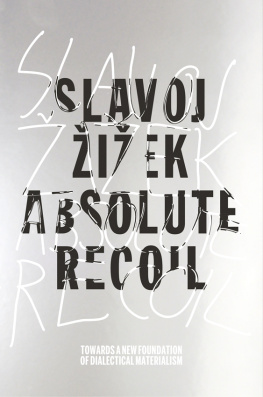ANDREW J. DOUGLAS
No part of this book may be used or reproduced in any manner whatsoever without written permission. No part of this book may be stored in a retrieval system or transmitted in any form or by any means including electronic, electrostatic, magnetic tape, mechanical, photocopying, recording, or otherwise without the prior permission in writing of the publisher.
Production, Laurie D. Searl
Marketing, Anne M. Valentine
In the spirit of critique : thinking politically in the dialectical tradition / Andrew J. Douglas.
pages cm. (SUNY series in contemporary continental philosophy)
Includes bibliographical references and index.
ISBN 978-1-4384-4841-1 (alk. paper)
1. Dialectic. 2. Political sciencePhilosophy. I. Title.
ACKNOWLEDGMENTS

I have worked on this book off and on for the better part of a decade, and over the years I have managed to incur quite a few debts. I certainly owe special thanks to the friends and colleagues who have read and commented on drafts of various portions of the project, including Paul Apostolidis, Banu Bargu, Michael Bray, Lewis Hinchman, Shannon Mariotti, Dean Mathiowetz, Melvin Rogers, Greta Snyder, and Antonio Vzquez-Arroyo. I likewise owe special thanks to some dear teachers and mentors who have inspired and nurtured my work at my various institutional homes: Marianne Constable, Frederick Dolan, Robyn Marasco, and Nancy Weston at Berkeley; Joshua Dienstag, Allan Megill, Corey Walker, and Denise Walsh at the University of Virginia; Philip Dynia, Luis Miron, and Roger White at Loyola University New Orleans; and Gregory Hall and Preston King at Morehouse College. Justin Rose has been like a brother to me, and certainly this book owes much to his friendship. And I am incredibly fortunate to have come into contact with two outstanding graduate mentors at the University of Virginia; both Lawrie Balfour and Stephen White have nurtured this project from its inception and have exhibited just a remarkable sense of grace and generosity. Of course none of thisthe book, the career, the educationcould have been possible without the loving support of my father, Edward, for whom I am forever grateful.
Alternative versions of three chapters have appeared elsewhere. An earlier version of was published as C.L.R. James and the Struggle for Humanism, Constellations 20, 1 (March 2013), 85101. I thank the editors of these journals for their contributions and for allowing me to reprint this material. I also thank Andrew Kenyon, Dennis Schmidt, and the editorial team at State University of New York Press, as well as two anonymous reviewers, both of whom read the manuscript with great care and put forth a range of suggestions that have improved the book tremendously.
Revisions to the original manuscript were rather significant, and in a rather wondrous way, these revisions did not really take off until my daughter was born, or until my time was pressed like never before, indeed until I learned to manage my time, and my work, for the sake of what really matters. For this reason, among many others, I dedicate this book to three women in my life who really matter: my late mother, Kay; my dear wife, Marcie; and my lovely daughter, Juliana.
ONE
INTRODUCTION

Any effort today to revisit the modern dialectical tradition is to set out upon a beleaguered intellectual terrain. To put an ironic twist on the famed words of one of our conversation partners, we might say that the dialectical has become a tradition of dead generations, and one that really only weighs like a nightmare on the brains of the living. Nowadays mention of the dialectical legacy seems only to invoke forlorn specters of closed teleological narratives, presumptuous ontological assumptions, perhaps the delusional hubris of a grand Hegelian style of theorization. We are dealing, it would seem, with a rather forgettable legacy of modernist excess. But of course so much of this is common conjecture, based on a simplistic caricature of an elusive philosophical legacy. And part of the challenge here, a charge that doubles as part of the rationale for this project, is to expose such conjecture for what it is, to tell a broader and richer story about what dialectical thinking entails, in order ultimately to mine a set of intellectual resources that have tended to get buried under the purported dead weight of Hegelian and Marxian modernism.
One objective of this book, then, is to confront a historical problem, to pursue a more generous and nuanced reading of a complex and evolving set of ideas. But ultimately the project is stirred by an increasingly unsettling political problem. Marx's amplification of Hegelian thinking has forever linked the dialectical tradition with revolutionary politics. And this would seem to imply that the tradition sits rather uneasily with the general political ethos of the early twenty-first century. Today we confront a peculiar political moment in which so many seem so fired by discontent and yet so burned by resignation. It is, some have suggested, a kind of postpolitical age, one in which grim prospects for collective action, increasingly fugitive hopes for real structural change, undergird an embrace of the ethical as a preferred site of public engagement. This turn to ethics, to questions of how we might live the established structures rather than contest their hegemony, threatens only to exacerbate a public life increasingly devoid of substance or interest. Certainly the impulse to revisit the legacy of Hegel and Marx, to reconsider a dialectically informed critical theory, is moved by a felt need for some renewed political fervor. But what is referred to here as a spirit of critique is intended to address contemporary discourse on its own terms, to address the essentially ethical question of how we engage the political. The idea, the wager, is that a reconsideration of the dialectical tradition might help to reanimate the critical imagination in our time and to inform a public ethos imbued with a sharper and more politically incisive critical edge.
So the argument put forth in this book is moved by a historical problem and by a political one, and this introductory chapter sets out to elaborate on these twin concerns. Insofar as the overarching concern is to engage with the modern dialectical tradition, it is important to note at the outset that we are dealing with a rich, wide-ranging, and still evolving body of work. Any attempt to fully canvas the tradition today would require a rather Sisyphean sense of determination, and what has worked its way into the pages of this book amounts neither to a general introduction nor to a comprehensive survey. While I engage initially with Hegel and Marx, with the root sources of the tradition, I focus most intently on Jean-Paul Sartre, Theodor W. Adorno, and C. L. R. James, three twentieth-century theorists who have caught my attention in a unique way and who have inspired me to craft a particular story about dialectical thinking and its enduring political import. I will outline the basic contours of this story in a moment. First I will provide some additional context by elaborating further on the two basic concerns that animate the project.

